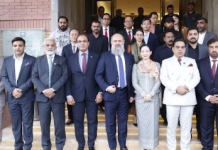We expect Taliban Government to take concrete measures against terrorist elements and their perpetrators that wish to derail Pak-Afghan relations,”
Saifullah Ansar
ISLAMABAD, October 12 — Pakistan’s Foreign Minister, Senator Mohammad Ishaq Dar, expressed deep concern over the recent escalation along the Pakistan-Afghanistan border, calling unilateral attacks and raids by the Taliban government a “serious provocation.”
Dar said Islamabad’s defensive measures, including recent strikes, were directed against Taliban infrastructure and aimed at neutralizing “Fitna-e-Khawarij and Fitna-e-Hindustan terrorist elements operating from Afghan soil.” He added that Pakistan’s response was carefully calibrated to avoid harm to ordinary Afghans. “Our defensive response is not targeted towards peace loving Afghan civilian population. Unlike Taliban Forces, we are exercising extreme caution in our defensive responses to avoid loss of civilian lives,” the foreign minister said.
The developments follow heavy exchanges of fire after Afghan Taliban forces reportedly launched unprovoked aggression against Pakistani positions. Pakistan’s military says it retaliated decisively, with security sources confirming the destruction of Manojaba Camp 3 — described as a significant Taliban staging post used for cross-border attacks. Video footage shared on social media shows large explosions and the camp engulfed in flames.
Security officials claim the strike inflicted substantial losses on Taliban fighters and foreign militants believed to be hiding at the site. “Pakistan will take all possible measures to defend its own territory, sovereignty and its people,” Dar warned, urging the Taliban government to detain and punish militant groups that threaten bilateral ties. “We expect Taliban Government to take concrete measures against terrorist elements and their perpetrators that wish to derail Pak-Afghan relations,” he added.
The exchange marks a serious uptick in violence on the western frontier, increasing fears of a broader destabilization that could have regional consequences. Islamabad has repeatedly accused the Taliban administration of failing to rein in the Tehreek-e-Taliban Pakistan (TTP) and other extremist networks using Afghan territory to plan and launch attacks into Pakistan.
Analysts caution that sustained clashes risk drawing Islamabad into a protracted confrontation at a time when internal political divisions and tensions with India on the eastern border already strain national resources. Observers called for de-escalation and renewed diplomatic engagement, stressing that coordinated mechanisms to tackle terrorism are preferable to unilateral action that could widen the conflict.
Pakistan insists its actions are defensive and targeted solely at militant infrastructure, not civilians. Still, the incidents have heightened anxiety in border communities and raised urgent calls for both sides to restore communications and pursue joint measures to secure the frontier. Domestic political leaders urged to set aside differences and prioritize national cohesion so that the security institutions can focus on protecting nation.

















